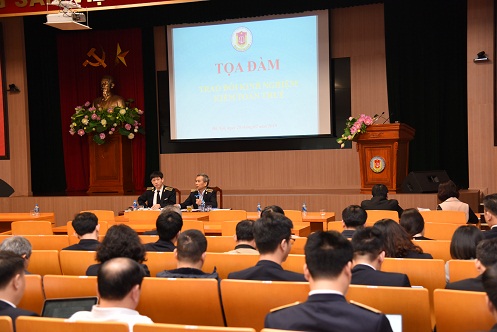The world has entered the fourth industrial revolution (Industry 4.0) towards automation and data exchange in manufacturing technologies. As a contribution to this trend, the application of Information Technology (IT) in tax administration has played a significant role in the context of the increasing number of taxpayers, diversified scale and areas of operation. This is also posing many challenges for the State Audit Office of Vietnam (SAV) during the tax audit process.

The scene of an experience sharing seminar on tax audit hosted by the SAV – Photo: N.Loc
Significant achievements in the application of IT in the tax industry activities
Currently, IT is being widely applied in all stages of taxation. It has helped simplify tax administrative procedures, reduce costs for businesses and people as well as manage and drive rapid and sustainable revenue growth. The statistics show that by the end of 2017, there has been electronic tax declaration applied in 63/63 provinces and cities and 100% of tax departments with 624,000 tax-paying accounts registered in the system, accounting for 99.8% of total enterprises; the number of enterprises registering to pay electronic tax reached 97.9%. In addition, the tax sector has implemented the Tax Management System (TMS) to support 63 local tax departments and tax branches with more than 830,000 corporate tax codes and nearly 45,000 individual tax codes...
According to a report on the implementation of Resolution No.36a/NQ-CP dated October 14, 2015 of the Government on e-government, by the end of 2017, in 336 administrative procedures, there are 161 online public services at level 1; 48 online public services at level 2; 5 online public services at level 3 and 122 online public services at level 4. The results of online public services at level 4 have shown the great efforts of tax authorities during the past time to reform administrative procedures, create an interactive environment for tax administration agencies, enterprises and citizens in tax registration, filing, payment and refunds on exported goods and services through internet connection.Accordingly, taxpayers are allowed to directly submit tax declaration and refund dossiers, make remittance into the state budget and resolve tax refunds electronically in a quick manner via the web portal of General Department of Taxation.
Challenges and opportunities for applying IT in tax audit activities
It can be seen that Industry 4.0 has changed the current methods of tax auditing by accessing the tax dossiers for tax declaration, payment, refund, exemption and reduction...In addition, auditors are exploiting the data of the tax industry by extracting data from its source system to serve all stages of tax audit activities.
As a result, Industry 4.0 will affect the SAV’s management and administration methods, subjects, scope and range of a tax audit; tax audit methods based on a digital database; requirements for the capacity of tax audit, information technology skills and exploration of auditors’ tax management programs.
The achievements of Industry 4.0 with computer network and digital data will help to ensure that tax audit work shall not be limited by geographical distance. Accordingly, auditors may access any dossier of Tax Departments while they are at the General Department of Taxation. As a result, it shall contribute to the effective use of resources and a saving in time and manpower from the exploitation of tax data.
Besides the above-mentioned opportunities, Industry 4.0 will also bring many challenges to the audit activities as a whole and tax audit in particular. First and foremost, it is neccessary to identify limitations or shortcomings in applying IT into the current tax audit activities. Due to various reasons, the current efficiency of IT application does not fully meet the requirements of tax audit work, specifically:
The efficiency of current IT application due to various reasons does not fully meet the requirements of tax audits: Shared items and database which have been not agreed causes difficulties in data sharing and linkage; a tool to connect and integrate with tax management information system has not been built in order to collect data and information for audit work; there has not been a standardized data set for auditing; the assistance tools have not been sufficiently developed to serve different aspects of auditing, especially there has not been any software to provide the assistance in tax audit; a big data management system together with effective tools for collection, standardization, analyzation and prediction has not been built.
In addition, the several opinions also state that the SAV has a shortage of auditors who are good at tax auditing and IT; although the training of auditors has been paid attention by the SAV, there is still a big shortage of qualified auditors who are able to adapt to the ever changing work environment of Industry 4.0. Currently, tax audit works are mainly carried out on paper based form. Meanwhile, Industry 4.0 which helps to convert all these data into diverse and elusive electronic information shall be able to cause difficulties to auditors in completing the audit missions in the long run.
It is necessary to implement synchronized solutions of IT application in tax audit activities
On the basis of the issues raised and in order to improve the effectiveness of tax audits in the upcoming period, the SAV should have a solution prepared to establish and exploit effectively information resources from the database of the tax industry to serve tax audit works; pay attention to the methods of identifying and evaluating the appropriateness of digital audit evidences gathered by the SAV from the IT systems of tax industry; change audit standards and procedures in order to better suit the method of tax audit in the Industry 4.0 period. Moreover, both the SAV and tax agencies have solutions to increase information security during the audit process. The SAV should simultaneously strengthen equipments and softwares to serve tax audits and provide auditors with further training so that they can possess specialized knowledge on tax management and information technology.
SPECIALIZED AUDIT DEPARTMENT NO.II